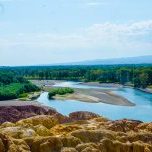Stockholm, Aug. 20(ChinaEuropeDialogue)– Concerns have risen in Iran over possible tide of Afghan refugees.
Source: Xinhua| 2021-08-20 09:48:11|Editor: huaxia
by Xinhua writer Gao Wencheng
TEHRAN, Aug. 20 (Xinhua) — Recent developments in Afghanistan have stirred up concerns in other nations over the spillover effect of the Afghan crisis. Among them, Iran, a neighboring country that already hosts millions of Afghans, must now prepare for a possible surge in refugees.
“As long as the political landscape in Afghanistan is unclear, the flow of refugees from Afghanistan will not subside,” Iranian news network Press TV reported, citing Iran’s border police.
FURTHER INFLUX
Video on social media show that large groups of Afghans, carrying simple baggage on their backs and holding their children’s hands, crossed the Afghanistan-Iran border to seek asylum.
Press TV’s camera recorded the story of pregnant Maryam and her family, who had walked for 48 hours before reaching Iran.
In their journey from Afghanistan, they took the wrong path that led them to climb the border wall overnight. Unfortunately, Maryam fell on her stomach on the Iranian side of the border and lost her baby.
According to Press TV, “upon their arrival in Iran, the Afghan family were caught by Iran’s border police, who then took them to this temporary camp, filled with hundreds of Afghan asylum seekers who have fled an uncertain future in their country.”
The Taliban said Tuesday it intends to form an inclusive government in Afghanistan and does not want to have any internal or external enemies after the group has taken over most parts of Afghanistan and President Mohammad Ashraf Ghani left the country.
In response to recent conflicts in the neighboring country, Hossein Ghassemi, director-general of border affairs at Iran’s Interior Ministry, said in an interview with official news agency IRNA that temporary accommodation has been prepared for Afghan refugees in all three Iranian provinces neighboring Afghanistan.
Considering the recent developments in Afghanistan, Iran is expected to encounter an inundation of Afghan refugees, he said, adding that particular attention will be paid to the possible spread of the coronavirus.
According to Iranian media, based on the latest data before the possible new tide of immigrants, more than 3 million Afghans are living in Iran — some 780,000 Afghan refugees, over 2 million undocumented Afghans, and another 600,000 Afghan passport-holders with Iranian visas.
MULTIPLE CHALLENGES
“Insecurity in Afghanistan would have high negative impact on the internal conditions” of regional countries, international affairs analyst Hassan Hanizadeh told Iran’s Arman Melli daily.
“Flood of Afghan migrants to the surrounding countries, especially to Iran in the eastern borders, will leave high economic, security and cultural consequences for Iran,” Hanizadeh warned.
In a webinar on Afghanistan’s situation held by IRNA, Abdol-Mohammad Taheri, former Iranian charge d’affaires in Afghanistan, termed the U.S. hasty withdrawal from the country as betrayal, and said it had the most negative consequence for Iran, as Iran would face at least 3 million Afghan refugees, possibly including malign forces like the Islamic State and al-Qaida.
Similarly, “Iran has become one of the largest recipient countries of Afghan refugees due to the connected border, close culture, mature social network and other factors,” Su Xin, a Chinese expert on Iran, told Xinhua, adding the influx of immigrants will significantly add to pressure on Iran, which has suffered the dual impact of U.S. sanctions and the COVID-19 pandemic.
According to Su, the financial pressure due to the sanctions and pandemic impacts health care, education and subsidies. Furthermore, though Afghans in Iran are mainly engaged in the labor-intensive occupations, Iran’s high unemployment rate has led to competition between Afghans and Iranians for economic resources and in the labor market.
Meanwhile, illegal entry and work and the drug trade, Su said, could also pose a threat to social security in Iran. The combination of these factors could lead to an undeniable opposition among Iranian society to the acceptance of refugees.
Assal Rad, a senior research fellow at the National Iranian American Council, tweeted that “while Iran sees an influx of Afghan refugees, Iranians themselves are suffering through the pandemic & economic strangulation.”
“The U.S. has a central role in both parts of this disaster, and so it has a distinct responsibility to help instead of compounding the devastation,” she added.
CALL FOR HELP
The United Nations High Commissioner for Refugees said on Aug. 9 that it is “extremely concerned by the rapid escalation of conflict in Afghanistan,” adding “many more Afghan civilians may find themselves trapped if they are unable to escape from the highly volatile situation.”
In cooperation with Iran’s Bureau for Aliens and Foreign Immigrants’ Affairs, the agency said it has already provided immediate assistance to new arrivals, including food and water. Hygiene packs, including soap and face masks, will also be distributed to help families arriving to stay safe amid the ongoing pandemic.
The UN agency also appealed to the Iranian government to continue its tradition of hospitality and lifesaving protection in hosting Afghans fleeing protracted conflicts and violence for over 40 years, while urging the international community, in face of any major influx, to “step up immediate and sustained support to both Afghanistan and its neighbors, in a spirit of responsibility and burden-sharing.”
Likewise, the Iranian Foreign Ministry on Monday called on the international community to help displaced Afghans and welcomed the establishment of a coordination council to ensure a “peaceful transfer of power.”
“We hope the international community and the responsible bodies will pay serious attention to this issue, and especially in the context of the COVID-19 outbreak, will hasten to their inherent duties to help these displaced persons without delay,” said the ministry’s spokesperson Saeed Khatibzadeh.
Also on Monday, Iranian Foreign Minister Mohammad Javad Zarif touched on the issue of displaced Afghans and their flood toward neighboring countries as “one of the most important and vital issues arising from the Afghan developments.”
This needs serious attention, especially with regard to the difficult situation the pandemic has created, he said. Enditem

